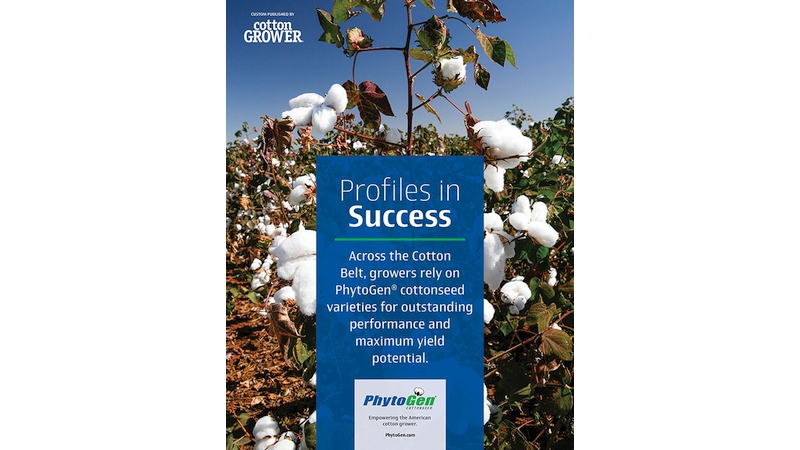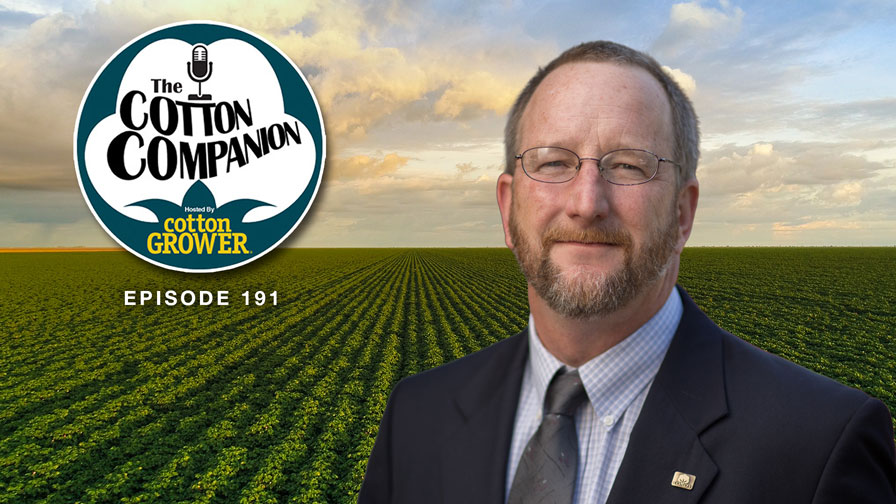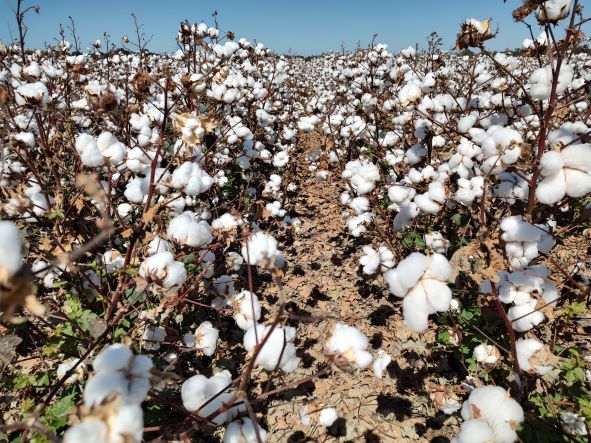Coley Wins Cotton Grower Achievement Award
In 1980, a 23-year old Chuck Coley found himself fully in charge of a highly complex and integrated cotton operation following the death of his father, Sonny. Some 30 years later, Chuck finds himself in a remarkably similar but happier position, himself alive and reveling in bringing his own college educated son into the cotton business.
Having a family heir to the business is a just reward for Chuck, whose hard work in the field and on behalf of U.S. cotton growers has earned him the 2012 Cotton Grower Achievement Award.
Deep Association Involvement
Located in the Dooly county seat of Vienna, GA, the Coley family farms 1,800 acres of cotton and peanuts and operates an integrated business that includes a gin and a peanut selling point. The operation also includes membership in Chickasha, a cottonseed processing cooperative. And beyond the operation, Coley has given back many-fold to the cotton industry by embracing numerous leadership roles over his years in cotton production.
“This is a great honor for Chuck, a man who cares deeply for agriculture and for the community, and who gives freely of his time to improve both,” said Jimmy Webb, a fellow southern Georgia cotton producer who served as president of Cotton Council International in 2012. “Chuck has been active in national, regional and state agricultural associations, and I am happy that his contributions to Southeastern agriculture are being recognized. He has maintained that high level of commitment even though he oversees a large diversified operation with services that include chemical, seed and fertilizer sales; peanut handling and warehousing; and cotton ginning, warehousing and marketing.”
Indeed, one could not have blamed Coley for focusing solely on his own circumstances in the wake of his father’s passing, but he was determined to become active in state and national cotton associations through active participation. He began attending regional ginner and producer association meetings and looking for ways to get involved. “I’ve always been a person that thought that organizations tend to move the industry you are in forward,” says Coley. “From the National Cotton Council (NCC) on down to the Southern Cotton Growers and Southeast Cotton Ginners Association (SCGA), when you are part of a group you can get a lot of things done that would be virtually impossible as an individual ginner or producer.”
Early involvement in the SCGA led to leadership opportunity in the National Cotton Ginners Association (NCGA), where he served as president. From there he moved into leadership roles on the producer side, serving on the board, and then as chair, of the American Cotton Producers Association (ACPA). In 2012, he served as chairman of the National Cotton Council.
In cotton, you have a strong voice because you represent the whole industry, from the producer to the textile manufacturer,” says Coley. “When NCC speaks, everybody know it is the entire cotton industry, not just some aspect of it.”
“Chuck is passionate about U.S. cotton and it shows when he speaks whether from the podium or in small meetings, and that has made him a very effective advocate for our industry,” said Jimmy Dodson, a Texas producer who served alongside Coley as Council vice chairman in 2012. “Even though Chuck is a forceful communicator, he listens well and considers others’ viewpoints, whatever the concern. That helped him be an effective facilitator and foster unity among our multiple industry segments as we shaped Council farm policy and positions on other key issues this past year.”
“To say Chuck is a tireless worker and an achiever is an understatement,” says Mark Lange, president and CEO of NCC. “The U.S. cotton industry has been blessed with many great leaders through the years and Chuck belongs in those ranks. He came to his current position with proven leadership skills and the full confidence of his industry peers and he has served admirably.”
Lange says that in many respects the Council’s agenda became Coley’s agenda for 2012.
“Chuck’s travels on behalf of the industry were very extensive and focused on virtually every Council priority issue, including the 2012 Farm Bill, the WTO dispute with Brazil, international contract defaults and agricultural appropriations,” Lange notes. “Many of these were not easy meetings, but Chuck relayed Council viewpoints and concerns to key legislators and government officials with great clarity and poise.”
As the cotton market has become increasingly globalized, that singular voice for U.S. cotton has grown in importance. Coley points out that there are many factors that are largely out of the grower’s direct control, from fertilizer costs to technology fees to the volatile nature of cotton pricing, based too often on the whims of foreign governments.
“You have to keep your eye on what’s happening in China and India,” says Coley. “Years ago the crop in the U.S. had a major impact on the market, but these days a bad crop here no longer means prices will be high. So much depends on foreign governments, which we’ve seen with China’s 20 million bale strategic reserve and India’s recent export ban. We have an 80 million bale carry over, and prices have gone from $1.90 cotton to 70 cents.”
But against these challenges, U.S growers need to maintain high yields to be competitive in this market, says Coley. Risk management is also critical, he says, and while the 2008 Farm Bill was better for cotton than the STAX program, Coley says that STAX will be a strong tool for managing risk.
A Course For The Future
At the local level, Coley is optimistic about cotton in general, and the long term prospects for his operation. The business is growing, and the state of Georgia is coming off what was by all accounts a monster cotton crop in 2012.
“In the Delta, where growers have many cropping options, they have seen a tremendous downturn in acreage,” says Coley. “They’ve lost acreage and infrastructure, and once that’s gone it is hard to get it back. While we have choices in Georgia, cotton fits in well with the climate. I think we will lose some acreage to corn, but I think cotton is a crop we can grow competitively worldwide.”
Coley is also buoyed by the new technology coming out in seed as well as some of the biggest yields the state has ever had this past season. And, in 2009 he welcomed his son Matt back home and has been getting him fully acclimated to the operation after gaining valuable experience in Washington politics.
Matt Coley graduated from the University of Georgia, and got the opportunity to work with Senator Saxby Chambliss on the Senate Agriculture Committee for nearly four years. His experience included working on the new Farm Bill, and while he enjoyed it he decided to return home to get married and join his dad in the family business.
“I was proud that he was coming back,” says Coley. “I had a lot of irons in the fire with farming and the business, and the business is growing. It was pretty rewarding that I was going to have a family member come back.”
Matt grew up around the business but was never involved in any decision making, so he’s learning a lot of things from the ground up both on the farm and at the gin over the past three years. Matt markets all of the cotton for the gin, and his dad admits he’s happy to let Matt take care of “all the things I don’t like to fool with,” like FSA, farm insurance and NRCS duties. “Anything that requires paperwork I turn over to him,” says Coley.
His Beltway experience has served Matt well in his role, as he brought an understanding of complex subjects such as FSA payment limits and various rules and regulations related to producing a cotton crop. “Everything gets more complicated,” says Coley. “EPA regulations are a challenge to keep up with, and we don’t employ a compliance officer. So it’s good to have someone that can read regulations and understand what they mean, how they can affect us and how we can be compliant.”
And Matt isn’t the only Coley who’s working there – it is indeed a true family business. His wife, Deby, serves as the bookkeeper, and his daughter Dru is able to break away from her full-time job in Charlotte to help out around the operation during the busy times of year.
Coley has achieved a lot up to now, but he’s just as bullish on the future as the stars align for his family, his business and the industry. “We live in a good county with good customers, and the future looks bright for years to come,” he says. “You always want higher prices, but cotton producers are adaptable and there are many tools available today, and more on the way, to help us succeed. We have had our ups and downs, but long term we will be in the cotton business.”









